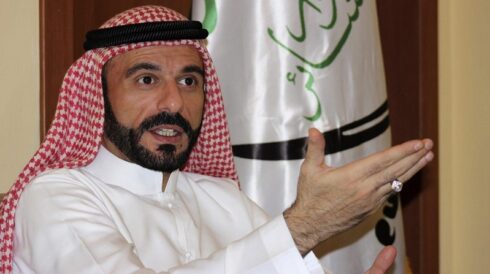Written by Damir Nazarov
While the Palestinians are valiantly fighting the occupiers, quite negative political processes are taking place in the Sunni part of Iraq, which have the potential to escalate into a military conflict.
It seems that none of the leading Sunni leaders in Iraq heeded the words of the Secretary General of the Islamic Party of Iraq, Rashid al–Azzawi, who last October expressed his readiness to “go on jihad against the Zionists.” Instead of supporting Palestine, the leaders of the Sunni regions are fighting for the portfolios of the provincial heads’ offices. But it is not only political ambitions that have become a big obstacle for the Sunnis of Iraq on the way to occupied Palestine.
More recently, Ali Hatem Suleiman recalled himself, calling for the separation of Anbar province from Iraq. The former head of the rebels, after a long stay in Jordan, reappeared on the political scene in Iraq, and again with separatist slogans. In the context of the Zionist aggression against the Gaza Strip and the sluggish withdrawal of the NATO occupiers from Iraq, such statements from the symbol of the tribal rebels of Anbar in 2014 look extremely provocative. Given the experience of organizing protests and forming armed groups, Ali Suleiman may in a short time again become the main source of encroachment on the integrity of Iraq.
It does not matter at all whether Ali Hatem Suleiman and his local allies coordinated their actions with the Zionists or not. The important thing is that this person has no interest in the Palestinian tragedy. He continues to be driven by irrepressible ambitions, even against the background of the unpopularity of the idea of creating an “Anbar emirate.”
There are many rumors about the “rebirth” of a well-known separatist, up to a local conspiracy theory. For example, it is in 2022 that there is a version that Ali Suleiman’s return (since 2014 he has been holed up in Jordan) to the political affairs of Anbar is connected with an attempt by certain circles inside “The Coordination Structure” (a large Shiite political bloc) to create a counterweight to the former speaker of parliament, Muhammad Halbousi, who is the most influential figure in Anbar. Such conversations took place against the background of rumors about the impending “normalization” of relations between Iraq and the Zionists. At that time, Shiites and some Sunnis accused Halbousi of seeking to recognize the Zionist essence, after which Ali Hatem Suleiman entered the arena and directly condemned the then speaker of parliament and the process of “normalization” through social media. Critics of this version point out that Halbousi “never supported“ the process of establishing relations with the Zionists.”
The conspiracy theory is that the “Shiite secularists” from the ruling establishment, with the help of a “light provocation” related to encouraging the political activity of the former main “revolutionary of Anbar”, decided to pull off a “grandiose counterplay” against the resistance factions. The move was that in connection with the exchange of strikes between the American occupiers and the forces of the Islamic Resistance of Iraq, against the background of the “flood of al-Aqsa”, Shiite secularists would like to avoid a full–scale escalation and, on the one hand, prevent the withdrawal of the American coalition, and on the other, divert the attention of local factions to another enemy, which Ali Suleiman should become. Critics of the conspiracy theory note that the former leader of the “revolutionary tribes” himself has never refused to cooperate with the Americans and sees the base of the occupiers of Ain al-Assad as a guarantee of protection from Shiites and local Islamic forces. Therefore, in the event of Anbar’s rejection from Iraq, the rebels will a priori demand the presence of Americans at home. Therefore, it makes no difference for the resistance factions whether to fight the Americans now or wait for a new round of separatism.
Two years apart, we see several versions about the sudden activity of the main figure of the Anbar rebels in 2014. But, of course, provocations by regional forces in the face of the UAE, the Turks and Jordan, where there are pro-Zionist stakeholders, whose goal is to foment new chaos in Iraq, cannot be ruled out. In order to prevent Iraqi activity in the direction of Palestine. Nevertheless, Iraqi drones are still attacking the Zionists, and the base of Iraqi militias in Syria is successfully expanding. As for Ali Hatem Suleiman’s provocative statements, to this day none of the local residents have responded to his calls, we do not see rallies, strikes and an armed uprising. Times have changed, and today the bulk of a large Sunni province sees primarily the economic and political benefits of an alliance with Baghdad. Nevertheless, one should not forget about his influence on a number of leaders of large tribes of the province.
Therefore, what will happen in the future is known only to God.
Ali Suleiman is right about one thing, the absolute majority of Anbar’s political representation is interested in personal gain and they are much more concerned about the situation of their tribe than solidarity with Palestine and readiness to fight for occupied al-Quds.







the pmf will crush any sunni-wahhabi separatist in iraq like they crushed daesh.
this are the jahil people son of zionist and yazid . who has nothing to do with islam and ummah. just worl for thier own benfit . its better iraqi force capture him and put him jail for creating sepratism and rift between iraqi unity